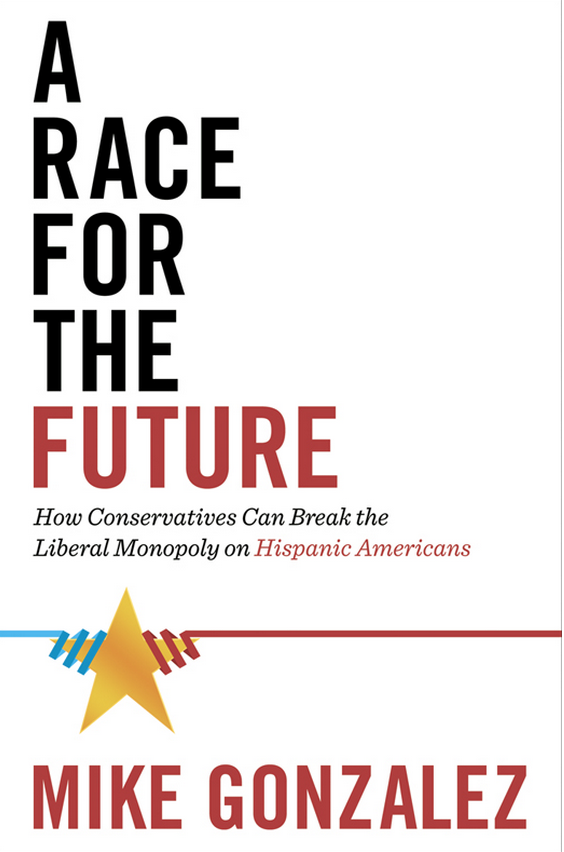[protected-iframe id=”ce608f02fa0733234f21045541d2d8e5-46934866-60066902″ info=”https://w.soundcloud.com/player/?url=https%3A//api.soundcloud.com/tracks/166223098&color=ff5500&auto_play=false&hide_related=false&show_comments=true&show_user=true&show_reposts=false” width=”100%” height=”166″ scrolling=”no”]
Videos by Rare
Kurt Wallace: This is Kurt Wallace and our guest today on Rare is Michael Gonzalez, senior fellow at the Heritage foundation, his new book A Race for the Future How Conservatives Can Break the Liberal Monopoly on Hispanic Americans, and Michael thanks for being with us today on Rare.
Mike Gonzalez: Entirely my pleasure.
Kurt Wallace: Michael, now as far as this book coming out at this time, the Hispanic vote has really been the Democrat vote up to this point. How does the Hispanic population outside of DC sit on the political spectrum?
Mike Gonzalez: Well, George W. Bush, the second time around in 2004, was able to get 40% of the vote which was obviously a lot better than Romney’s 27%. I think Hispanics… by the way, I take issue with the title that label itself. I think you have Cuban-Americans and Puerto Ricans and Mexican-Americans and so forth. But if you want to talk about Hispanics, I think they are still a swing group.
I think conservatives, we have sometimes manage to alienate them by not using the right tones. But what I think we need to do, what conservatives need to do is speak to them in the language of opportunity. And show them what are the right policy what can the government do that leads to success. And more important than that Kurt–what has the government done that has created road blocks to their success?
So, we have to talk to them about upward mobility or to be loftier, the American dream.
Kurt Wallace: I see. So, crafting the message to Hispanics for conservatives has been failing because the tide turned completely in the opposite direction from Bush to Obama?
Mike Gonzalez: Yeah we’re really, the reason I title my book ‘A Race for the Future’ is I do deeply believe that we’re in a race for the future of America. And Hispanics hold one of the keys to that future. Whichever side, whichever philosophy, that conservative philosophy, that progressive philosophy is able to capture their hopes, will do a lot better and will be able to enact policies that’ll fit with that philosophy.
And I think that conservatives don’t have a moment to waste. They have to engage they have to talk about what it is this country is about, what conservatism is about. I think conservatism is often mislabeled by the media as an individualist Randian the-devil-take-the-high most philosophy. But it’s not. It is pro-community. It’s pitching in and looking out for the other guy and that’s what conservatism is. Government progressivism on the other hand is government leading you. There are very good conservatives right now such as Yuval Levin that talk about we’re all dependent right? Dependency is part of the human condition, the question is am I going to depend on my wife and she on me? Or are we going to depend on a faceless bureaucrat sitting in a remote capital?
Kurt Wallace: In the Hispanic culture family is very important. This is something that is very important with conservatives traditionally. Is this an inroad?
Mike Gonzalez: Most definitely and we need to show how the entitlement system, which applies to all not just with Hispanics, undermines the family. And it undermines the family in a huge way. Familism, the family is one of the strengths of Hispanics we need to speak about that. We need to talk about why we are seeing such a large out-of-wedlock rate among Hispanics among all Hispanic groups by the way. We also need to talk about education and the importance of school choice. Hispanics are very pro school choice because they know that your children are being put into bad school, and they find it terrible that they cannot get their children out and give them a better future.
Kurt Wallace: In your understanding of immigration and economics is there a strong relationship between the two in a welcoming immigration system and a healthy economy?
Mike Gonzalez: Well, we’ve done – this is a country of immigrants. I am an immigrant and a proud immigrant. My family came to this country because it had freedom and prosperity because of the American dream. And because we were living in a country that had a communist dictatorship, Cuba. But in the last 50 years with the creation of minorities a minority vs. majority discourse which is new in our society. And the creation of entitlements based on your status as a victim. What we have done is we upended three centuries of immigration experience that started with the Germans and the Scotch-Irish in the 1600. We need to go back to the way we used to do immigration. We used to be very good at it. And that’s the reason why this country was sch a magnet for immigrants.
Kurt Wallace: Now are the Hispanic Americans throughout the country. You mention different, Cuban Americans and Mexican Americans do you have to approach each country of origin in a certain way as a message?
Mike Gonzalez: That’s what the Obama campaign did in 2012 to huge success. You know, Mr. Romney, a very good man, did not do that. When it came to Hispanics, you know, the Obama campaign was playing chess and the Romney campaign was playing checkers. We need to for example take Mexican-Americans they are the oldest group in this country. Some of them were here, have been here, their ancestors their roots have been here since the 1600’s and 1700’s. Not that this is a small minority of Mexican-Americans because at the same tie Mexican-Americans can be the newest immigrants they haven’t made out the lion’s share of the new immigrants that have come in legally and illegally over the last 20 years. Cubans began to come in really in the 1950’s except in the late 50′ except for a small group of Cubans that went to Tampa Bay and Key West in the 19th century really Cubans did not immigrate because they liked it in Cuba. Puerto Ricans began to come in the 1950’s.
You have to have all of this in mind as you approach different groups. You know one of the things that the Obama campaign did very well is that they talk about Latinos. However, when they’re talking from the podium they are talking that way but when they approach the groups they micro target them. So, conservatives have to be very aware of all that.
Kurt Wallace: In the media the tea party and different conservative groups have been portrayed as being hate mongerers towards immigration and immigrants and Hispanics in particular saying things like ‘learn to speak English’ those sorts of things and that’s been capitalized on by the Democrats and the liberal media as well. How do we combat that?
Mike Gonzalez: You know, there are many things that fall under the hat of tea party, right? But the way the media has portrayed the tea party has been awful. If the tea party were the way you just described they wouldn’t have embrace Marco Rubio and elected Marco Rubio and they wouldn’t have embraced Ted Cruz and support him the way they do now.
So, I think that the way the media describes the tea party the tea party adherence these good Americans who stand up for the Constitution. I’m not going to speak for every last member of the tea party. By the way there is no membership. I’m talking about the people that I have met the people that are the thrust of the movement. It’s about preserving the constitutional Republic. And the fact they were portrayed by the media says more about the media than it says about them.
Kurt Wallace: In terms of crafting a message that appeals to Hispanics and dealing with this false identity that has been portrayed what do you recommend?
Mike Gonzalez: Well, I would recommend not crafting a message for Hispanics. You talk to individual groups of immigrants – Cuban-Americans, Mexican-Americans or Puerto Ricans or Bolivian-Americans about their aspirations. What they want to be? What they want to attain? Tell them that they can be mobile. That they can aspire to the American dream. That this is an inclusive country. Where you can in deed be mobile. And I think that would be a winning strategy for anybody that talks that way.
Kurt Wallace: Michael, one final question. In terms of how economics and immigration fit together there is a philosophy out there with a lot of Austrian economists that say that when immigration is flourishing and you’re welcoming that the economy follows in suit and that when a country starts to tighten up on their immigration policies and be somewhat anti-immigrant that their economy suffers?
Mike Gonzalez: For a very good example of that, you need look no further than Spain. Which in 1492 decides to take out all its Jewish citizens and also its Muslims and it really finishes the process of kicking out its Muslims by the 1570’s. In within 100 years of that Spain goes from being the leading European power to being a basket case. Because once it kicks out all its Islamic the adherence of Islam and the adherence of Judaism it kicks out a lot of people that had a lot of skills. So, it suffered greatly from doing that. But there’s a further complication which is with immigration the assets improvement to the economy accrues nationally but it’s stresses are felt locally. That is something that Harvard’s Robert Putnam has done a lot of work in. He’s covered this that the good things happen at the national level and the stresses especially at the short and medium term with immigration happen at the level or the community level.
Kurt Wallace: Michael Gonzalez, Senior fellow at the Heritage Foundation. Your new book A Race for the Future How Conservatives Can Break the Liberal Monopoly on Hispanic Americans thanks for being with us today on Rare.
Mike Gonzalez: Thank you.




